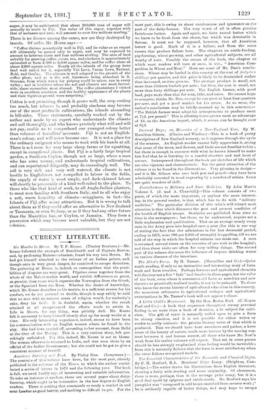American Farming and Food. By Fiulay Dun. (Longmans.)— The contents
of this volume have been, for the most part, already published in the columns of the Times, to which the author contri- buted a series of letters in 1879 and the following year. The book is full, owe oeed hardly say, of interesting and valuable information. To take an instance at random, there are several pages about dairy. farming, which ought to be instructive in the last degree to English readers. There is nothing that commands so ready a market in and attar Leaden as good butter, and nothing so difficult to get. For the most part, this is owing to sheer carelessness and ignorance on the part of the dairy-farmer. The very worst of all is often genuine farmhouse butter. Again and again, we have tasted butter which we knew to be fresh from the churn, but which was detestable in flavour. It must not be supposed, however, that all American bntter is good. Much of it is a failure, and from the same causes that produce failure here. The chapters on cattle-feeding, pig-farming, Wheat-growing, and other agricultural subjects, are all worthy of note. Possibly the cream of the book, the chapter to which most readers will turn at once, is xxv., "American Com- petition in Wheat and Meat." Here are some of Mr. Dun's conclu- sions. Wheat may be landed in this country at the cost of forty-two shillings per quarter, and this price is likely to be diminished rather than increased, as time goes on. The average product is small, not more than thirteen bushels per acre ; but then, the cost is small, not more than forty shillings per acre. The English farmer, with good land, pays more than that for rent, tithe, and rates. He cannot hope to compete, thinks Mr. Dun, except lie can grow at least four quarters per acre, and get a good market for his straw. As to moat, the author's conclusions may be briefly summed up in this sentence,— " The British farmer must adapt his arrangements to produce meat at 74d. per pound." This is allowing home-grown meat an advantage of Id. on the American import, which, it seems, can be brought over at 64d.






























 Previous page
Previous page